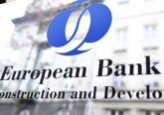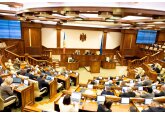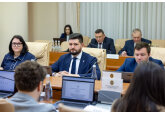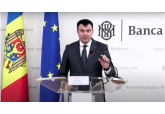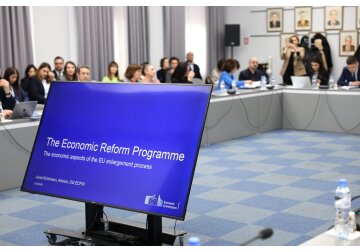
Representatives of the Moldovan government and the European Commission discussed the second Economic Reform Program for Moldova for 2025-2027
According to the Ministry of Finance, in particular, the European mechanism of coordination and monitoring of economic policies, necessary to bring Moldova in line with the EU standards, was presented during the event “Macroeconomic and Fiscal Policies Towards the EU”, organized by the Ministry of Finance in partnership with the PPF Technical Assistance Project and the EU Delegation in Chisinau. The Ministry of Finance initiated this dialogue to present the second Economic Reform Program together with officials from the European Commission's Directorate General for Economic and Financial Affairs (DG ECFIN). The event was attended by more than 70 representatives of central public authorities, international development partners, economic experts, members of the academic environment and business associations. The main objective of the event was to analyze the progress in the development and implementation of the Economic Reform Program for 2025-2027, to highlight medium-term macroeconomic forecasts and budget plans for the next 3 years. This strategic policy document is essential for the country's economic integration into the EU, providing a clear vision of the reforms needed for fiscal, investment and macroeconomic stability. Finance Minister Victoria Belous thanked the representatives of the ECFIN Directorate General for the assistance and support provided in Moldova's European integration process. She stressed the importance of this document for the Finance Ministry, noting that the second program was improved with new proposals and detailed descriptions in order to better implement the reforms. For his part, Joost Kuhlmann, Representative of the ECFIN Directorate General at the European Commission, commended Moldova's efforts, stressing that this dynamic process involves constant learning and gradual adjustments, contributing to the compliance with the EU norms and best practices. One of the central topics discussed during the event was the need to increase public investments, with the experts emphasizing the importance of using the mechanism of selecting projects for financing, in order to ensure efficient and sustainable investments, contributing to the development of infrastructure and increasing the competitiveness of the national economy. Also discussed were the problems related to the budget deficit, which remains high, but with a tendency to gradual reduction. The importance of broadening the tax base and optimizing public expenditures through periodic reviews of key expenditure areas, such as social protection and health care, was emphasized to ensure optimal use of budgetary resources. Another aspect considered was ensuring price and financial stability, taking into account the impact of external factors, including the energy crisis and the geopolitical situation. Experts recommended maintaining prudent monetary policy, strengthening the regulatory framework and harmonizing supervision of the banking and non-banking financial sectors to mitigate macroeconomic risks. The event also provided an opportunity to discuss key aspects of the Economic Reform Program, including the benefits of monitoring the process, best practices from Serbia and North Macedonia, and progress made in implementing the 2024 recommendations. The event included presentations and interactive discussions, emphasizing the importance of active participation of all stakeholders, including civil society and business representatives, to ensure a transparent and effective reform process. The Ministry of Finance stated that it will continue to monitor the implementation of the Economic Reform Program in cooperation with European partners, ensuring a sustainable transition within the EU accession process. The Finance Ministry remains committed to implementing the necessary reforms for the European economic integration, focusing on financial transparency, attracting investments and strengthening macroeconomic stability. Moldova became an EU candidate country in 2022 and was invited to participate in the Economic Reform Program. In January 2024, the country presented its first Economic Reform Program, evaluated by the European Commission in May 2024. On May 14, 2024, Moldova, together with the other candidate countries and the EU Presidency trios, adopted the General Conclusions with three economic policy recommendations for the next 12 months. In January 2025, Moldova presented its second Economic Reform Program. // 28.02.2025 - InfoMarket



